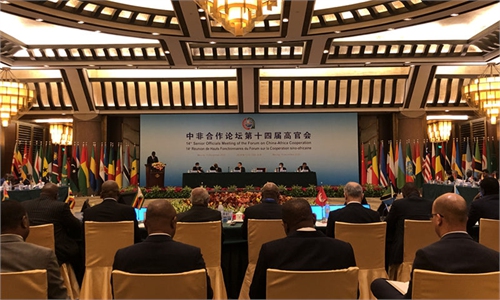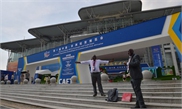COMMENTS / EXPERT ASSESSMENT
Health cooperation, FTAs highlight China-Africa ties

Illustration: Xia Qing/GT
With the deadly coronavirus still raging globally, the tough 2020 drew to an end and the new year initiated. Chinese State Councilor and Foreign Minister Wang Yi on Monday started his first overseas visit in 2021 to Africa, heralding deepening ties of the two sides in which vaccine cooperation and free trade agreements would be new highlights during the post-pandemic era.Since 1991, Africa has been the destination for Chinese foreign ministers' first overseas visit each year. As a continuation of this fine tradition, it demonstrates the high importance China attaches to its relationship with African countries, which has emerged stronger after a year of fighting together against the pandemic and continuing to bolster economic cooperation.
In spite of the raging COVID-19 pandemic across the continent, Wang started to visit Nigeria, the Democratic Republic of the Congo, Botswana, Tanzania and Seychelles, Xinhua News Agency reported.
Over the past year, the ruthless onslaught of the virus has dominated the world, claiming lives and battering the global economy. As the largest developing continent majorly offering raw materials, Africa has seen hard hit by the once-in-a-century global health crisis which caused declining global demand.
According to IMF estimations in October 2020, the GDP of Sub-Saharan Africa in 2020 was predicted to contract by 3 percent, "the worst outcome on record."
Under such circumstances, it would be still the primary task of China-Africa cooperation to focus on containing the virus, especially on vaccines cooperation. As one of the leading vaccine developers, China has developed multiple vaccines with high rates of effectiveness and has pledged to make vaccines a global public good. Recently, China has reached agreements with increasing number of countries on vaccine cooperation, including Turkey, Egypt and Indonesia.
In addition to virus containment, China has continued to promote economic cooperation with Africa and helped the countries fighting against the economic fallout of the pandemic. Wang recently introduced to media that China has signed debt service suspension agreements with 12 African countries and provided waivers of matured interest-free loan for 15 African countries. China has suspended more debt service than any other G20 member.
Moreover, the first free trade agreement (FTA) between China and an African country Mauritius came into effect on the first day of the year, with both countries aiming to eventually achieve zero tariffs on more than 94 percent of each country's tariff-eligible items.
As the first African nation achieved an FTA with China, it offers a positive reference for China and African countries to further enhance economic cooperation during post-pandemic era, especially when the global trade system has been undermined by unilateralism led by Trump administration for years.
China and Africa, the largest developing country and the largest developing continent in the world, have always enjoyed wide range of areas in which to cooperate, from poverty alleviation, infrastructure enhancement to industrialization.
Meanwhile, challenges persist alongside the enhancing China-Africa collaboration, including unstable political situation in some African countries as well as unrelenting defaming from certain Western politicians and media outlets. However, shoring up cooperation has always been the mainstream of China-Africa relations. China-Africa cooperation will not be disrupted by innuendos and the strong bond of friendship will not be weakened by disinformation.
The article was compiled based on an interview with Zhang Jianping, director of the Center for regional Economy, CAITEC. bizopinion@globaltimes.com.cn



